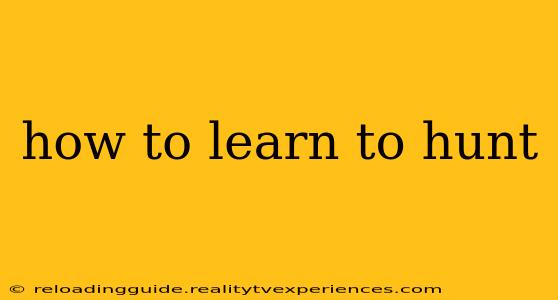Hunting is a deeply rewarding experience, connecting you with nature and providing sustenance. However, it's crucial to approach it responsibly and ethically. This guide outlines the steps to becoming a safe, skilled, and ethical hunter. This isn't just about shooting an animal; it's about respecting the animal, the land, and the tradition.
1. Understanding the Legal Framework & Ethical Considerations
Before even considering picking up a firearm, familiarize yourself with your local hunting regulations. These vary significantly by region and even by specific game. Key aspects to research include:
- Hunting Licenses and Permits: You'll need the appropriate licenses and permits to hunt legally. These often require passing a hunter safety course.
- Hunting Seasons: Specific seasons dictate when you can hunt particular animals. Hunting outside these seasons is illegal and unethical.
- Bag Limits: Restrictions are in place to ensure sustainable hunting practices and prevent overharvesting.
- Legal Hunting Methods: Understand the permitted methods for hunting each animal (e.g., archery, firearms, trapping).
- Land Ownership and Access: Always obtain permission before hunting on private land. Respect private property rights and posted boundaries.
Ethical Hunting: Beyond the law, ethical hunting demands respect for the animal. A clean, quick kill is paramount. Knowing your firearm and your limits is crucial. Wasting game meat is unethical, and you should plan to utilize the entire animal.
2. Mastering Hunter Safety Education
This is non-negotiable. A hunter safety course is essential before you even think about handling a firearm. These courses cover:
- Firearm Safety: Safe handling, storage, and transportation of firearms.
- Hunter Ethics: Respect for wildlife, land, and other hunters.
- First Aid and Emergency Procedures: Essential skills for handling accidents in the field.
- Wildlife Identification: Accurate identification prevents accidental shooting of protected species.
- Game Laws and Regulations: Reinforces understanding of legal requirements in your area.
Many states require completion of a hunter safety course before issuing a hunting license. Check with your state's wildlife agency for specifics.
3. Choosing Your Hunting Method and Equipment
The method you choose depends largely on your personal preferences, the game you're hunting, and the terrain. Common methods include:
- Bow Hunting: Requires skill, practice, and patience. It offers a more challenging and intimate hunting experience.
- Firearm Hunting: Offers a longer range, but demands precision and responsibility. Choose the right firearm for the game you're hunting.
- Trapping: A highly regulated method, requiring specialized knowledge and permits.
Essential Equipment:
Regardless of your chosen method, essential equipment includes:
- Firearm or Bow (if applicable): Properly fitted and maintained.
- Ammunition or Arrows: High-quality ammunition appropriate for the game.
- Safety Gear: Bright clothing, appropriate footwear, and possibly a hunting vest.
- Field Dressing Tools: Necessary for processing your harvest ethically and efficiently.
- Navigation Tools: Map, compass, GPS—crucial for staying oriented in the field.
- First-Aid Kit: Prepared for any potential injuries.
4. Developing Hunting Skills Through Practice and Mentorship
Hunting requires practice and skill development. Consider:
- Target Practice: Regular practice is crucial for accuracy and safety, regardless of hunting method.
- Mentorship: Learning from experienced hunters is invaluable. Seek guidance from a mentor or join a hunting club.
- Fieldcraft: Develop skills like stalking, tracking, and calling, which are crucial for successful hunts.
- Game Processing: Learn how to properly field dress and process your harvest.
5. Respecting Wildlife and the Environment
Hunting is a privilege, not a right. Responsible hunting means:
- Following all regulations and ethics.
- Minimizing your impact on the environment.
- Respecting other hunters and landowners.
- Conserving wildlife populations for future generations.
Becoming a successful hunter requires dedication, practice, and a deep respect for nature. By following these steps and prioritizing safety and ethical conduct, you can embark on this rewarding journey responsibly. Remember to always consult your local wildlife agency for specific regulations and licensing requirements in your area.

